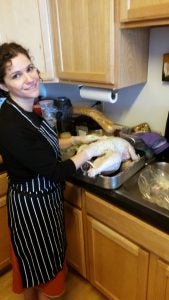Julia Wolfson | Assistant Professor, School of Public Health
As a former professional chef in fine dining restaurants, Dr. Julia Wolfson (SPH) studies how food preparation, eating behaviors, and policy affect diet and health. Dr. Wolfson’s recent study about sodium in restaurant meals made headlines. To learn more about Dr. Wolfson’s work, please click here.
In what ways does your work relate to sustainable food systems?
My work focuses on both food outside the home (including neighborhoods, restaurants and other food environments), and inside the home, specifically home cooking. Through this lens, my research focuses on environmental, cultural, and social determinants of diet quality and health.

Recently, I have focused on the way people perceive the meaning of cooking, what it means to cook in today’s food system, and how we measure this kind of behavior. What we have found is that in the current food system the kind of food available on supermarket shelves impacts how people understand what it means to cook. When you ask people, “how often do you cook dinner?” the interpretation of that question varies considerably and, for many people includes highly processed convenience foods that are ubiquitous in the food environment. People point to home cooking as a way of inspiring dietary change, although for a lot of people not being able to cook or a lack of confidence in their cooking ability is a significant barrier to changing their diet. Consideration of cooking skills and behavior, in addition to structural issues around food access and affordability is important to make change in consumption behavior and creating a sustainable food system.
What is a project you are excited to work on?
I’m very excited about an upcoming project that will examine food preparation and procurement practices among low-income adults in Michigan who are pre-diabetic. This study will yield rich qualitative data about challenges people face in their daily food preparation and strategies they use to overcome such challenges. I am particularly excited about this because most research about cooking skills and behavior is based on self report, and in this study we will be directly observing participants cooking. Ultimately, this work will inform the development of targeted cooking skills interventions.
What does your grandiose vision for a more equitable, healthy and sustainable food system look like?
I hope that our society can enact policies to help to make healthy, sustainable, ethically produced foods, more affordable, accessible and desirable. Everyone should have access to kind of ‘good’ food, no matter who they are, where they live, or how much money they make. I envision the healthy, sustainable food choice the easiest choice to make. While this vision seems far away right now, just imagine if we had a food system that primarily produced food that is good for the environment, good for food system workers, good for the local economy, and was also good for the people who consume those foods!
For many people, food choices are based on taste preferences that begin in childhood and are developed over time. Given the daily burden of putting food on the table day in and day out for one’s self and one’s family, the need to prepare food (or not prepare it), is, for many, driven by whatever is the easiest, most affordable, and fastest options available. Smart food policies and widespread individual behavior change will both be needed to make a healthy, sustainable food system a reality.
 Have any particular authors, articles or documentaries had a significant impact on you? Which one(s)?
Have any particular authors, articles or documentaries had a significant impact on you? Which one(s)?
“Kitchen Confidential” by Anthony Bourdain was hugely influential on me. I read it before I started working in restaurants, and thought to myself, “now that’s the life for me!” I read it again after working in the NYC restaurant scene for a few years and it really holds up! Now that I’ve been out of the restaurant business for a few years I really miss it sometimes. When I do, I watch Chef’s Table or Top Chef (my guilty pleasure food show). On a more serious note, I’m particularly looking forward to the upcoming book “Making Modern Meals” by Amy Trubek , who is a friend and colleague. The book has just been released and will discuss home cooking and its history in this country.
What is a strong food memory?
My parents were good cooks and cooked all the time. I recall my dad tormenting me by cooking ‘bunny’ (rabbit stew) during a phase when I refused to eat “cute” animals. My parents used make a simple roast chicken with roasted potatoes, lots of garlic, rosemary and pine nuts in a white wine sauce. Pinenut chicken, as we called it, was a frequent staple of our dinner table and I still make it to this day. Whenever I make it, I’m reminded of family meals from my childhood! It was simple, delicious, my parents made it well (and often), and everyone in my family loved it.
Upcoming Courses
- US Food Policy and Public Health (HMP 617), Winter 2018
- In Winter 2019, there will be a new food system course for undergraduate public health majors



